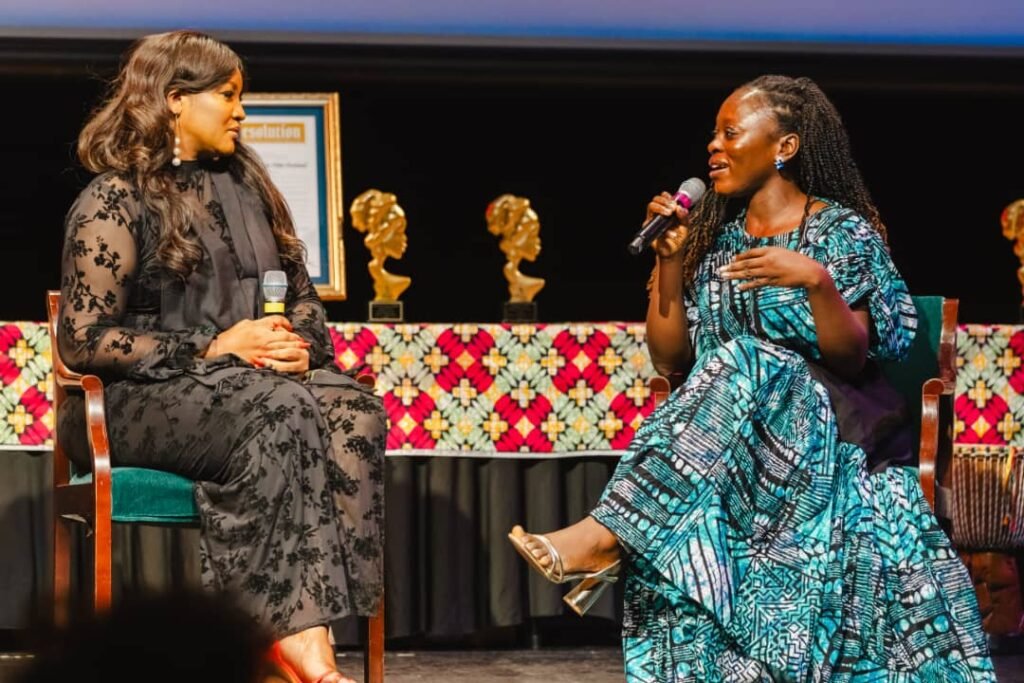
photographer credit by Asha Weal for R.I.C.E Media
By David Akinmola
At the recently concluded Silicon Valley African Film Festival (SVAFF), Nollywood screen icon and force in global media production, Omotola Jalade-Ekeinde, featured an American premiere of her directorial debut, Mother’s Love, and received the Trailblazer Award for her legendary contributions to African cinema and media.
Introducing her, the festival founder and lead curator, Chike Nwoffiah, described Jalade-Ekeinde as “the darling of so many people who understand the different creative expressions within the African continent.
She is one of Africa’s most iconic screen legends and global ambassadors.” As Jalade-Ekeinde took the stage, Rejoice Abutsa, a PhD candidate in Performing and Media Arts, at Cornell University, with research interests on women’s labor as a lens for examining the formation of global black media industries, was invited to join the celebrity in a fireside chat that radiated creative galaxies.
Abutsa set the scene with a question about Jalade-Ekeinde’s resilience, navigating life’s twists and turns; even, Nollywood’s evolution over the years with elements that are, sometimes, detrimental to its founding figures and tenets. Attributing her tenacity to some difficult childhood experiences, Jalade-Ekeinde recalled her father’s early death as epochal, growing rapidly from childhood to adulthood, caring for her family in ways that nurture a successful future.
Those events, however challenging, instilled remarkable confidence, enduring values in her professional life, and affirmative contributions to African film and media. Noting how Jalade-Ekeinde’s career inspires women within the film industry, Abutsa asked what historical figure she would like to play if the opportunity comes.
Without blinking, Jalade-Ekeinde pointed to Funmilayo Ransome-Kuti, a brave advocate of Nigeria’s independence and activist who, during her lifetime, fought for women rights, fair wages, better working conditions within informal market economies, equal opportunities and recognition of women’s vast contributions to the nation.
Not surprising, Jalade-Ekeinde utilises her social media platforms to highlight pertinent issues, for example, like lack of residual payments within the Nigerian film industry and the need for an urgent overhaul of such exploitative practices. In another remarkable moment, exploring the magnitude of history as a lens through which the future of African Cinema can be intricately understood and used to map the roads ahead, Abutsa asked the star about hopes for the field and how its consciousness can be improved for further success.
Jalade-Ekeinde cited Nollywood as a template that exemplifies how African screen industries can be self-sufficient: “We have done a lot. Nollywood broke internationally before Afrobeats. Nollywood has gone into the nooks and crannies of international spaces. We did it without Netflix and without global streaming platforms. We did it with VHS. When I think back, it reminds me that we were already that powerful, and told own stories, which were authentic stories.” Emphasizing the importance of returning to humane stories, an attribute now compromised by international streamers and global capital, JaladeEkeinde noted that Nollywood has demonstrated how home-grown stories, distributed via VHS and DVD, can transcend boundaries and sustain independent merits.
This auspicious fireside chat highlighted the importance of knowledge sharing between scholars, practitioners, audiences and generations by opening prodigiously insightful windows to African creative expressions; especially, as Jalade-Ekeinde, a philanthropist, has experimented with other media forms, like music and reality shows, worked in the industry for over thirty years, featured in over 300 films, is a voting member of the Academy of Motion Picture Arts and Sciences (Oscars’ committee) and, in 2013, alongside Michelle Obama, Kate Middleton,
Beyoncé, named one of TIME magazine’s 100 most influential icons, among other laurels which exemplify her versatility and vibrant visions. Abutsa’s scholarly interests richly complimented the fireside exchanges; more so, having co-convened stellar roundtables like, Towards a Sustainable Framework for Transnational NeoNollywood, and Nollywood Global Circuits.
In her closing remarks, Abutsa thanked JaladeEkeinde for being at the forefront of “centering Nollywood as a global character while retaining its Nigerian heart and history.” The audience robustly affirmed this view by cheering for the charismatic legend as Abutsa added that it would be impossible to conduct the type of academic research she does without the foresight, labor and resilience of women like Jalade-Ekeinde, whose works exude subtleties across generations, cultures and transnational spaces.
The fireside chat, kudos to the Silicon Valley African Film Festival principles, highlighted not just the place of African cinema in the global marketplace but how its growth, creative ranges and dimensions, contest assumptions, myths, stereotypes, and spark needful dialogs.








